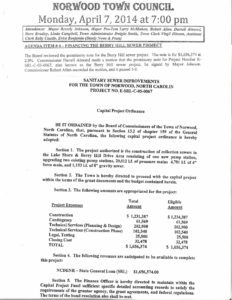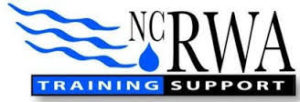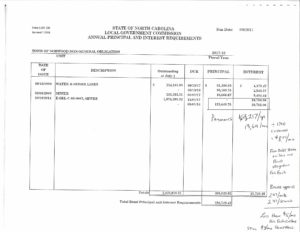Request for Proposals – Engineering Services
Annual Wastewater Performance Report for 2019
Hard copies of this report are available at the Norwood Town Hall.
Proposed Budget for 2020-2021
The proposed 2020-2021 budget for the Town of Norwood has been presented to the Norwood Town Council and is available for public inspection on the town’s website at www.norwoodgov.com and in the Norwood Town Hall, 212 South Main Street from 9:00 a.m. until 5:00 p.m. each weekday except Wednesdays.
There will be a public hearing on June 15, 2020 at 5:00 p.m. at the Norwood Town Hall for the purpose of discussing the proposed budget. Any persons who wish to be heard on the budget may appear.
The proposed General Fund budget is $2,520,050 and the proposed Enterprise Fund budget is $2,079,800.
For more information, call 704-474-3416.
To view the proposed budget, click here.
To view the Budget Message, click here.
Norwood Town Council hears presentation by NC Rural Water regarding Utility Rate Structure

On Monday night May 7th 2018, The Norwood Board of Commissioners heard a presentation by representatives of the NC Rural Water Association.

Terry Green and Marty Wilson presented their findings following an extensive review of the towns utility operations. The rate study was done at the request of Town Administrator, John Mullis.
Wilson remarked that a Proposed Rate Increase of 62 percent would be required in order for revenue to match expenses including debt service and depreciation. This would move your existing $16.44 rate to $26.63 ($10.19 on the base rate) or a 62% increase. Wilson advised council the town has not raised rates in several years. The recent Berry Hill Sewer project was approved in April 0f 2014 yet no provisions to pay for the additional debt requirement were made at that time. While you will have some debt dropping off from completed projects, the debt service for this project alone requires an annual payment of $163,000 for 20 years. Current State Bond Obligations. In current dollars, that equates to every utility customer paying $8/mo for 20 years to cover the state bond debt obligations for this one project alone. The current rate structure will not support this additional debt and leaves limited borrowing capacity to address other critical infrastructure projects that are greatly needed. This creates the need to pull from fund balance which should be a last resort. Ideally, rates are adjusted to accommodate for the additional debt load at the time the town encumbers itself for the project. In this case, a rate increase in 2014 and even beyond would have softened the need for larger rate increases now.
It is important to note, that as collection and distribution systems evolve, they too become more expensive to construct. As with every water and sewer project, while they typically serve a small percentage of the total users, the entire cost of the project is spread out among all of the rate payers. I want to be careful to not single out this one project but the additional debt service obligation created by this project is driving the immediacy for rate setting action.
Additionally, the town has two(2) critical projects in the works including the O’neal Alley Sewer Lift Station and the Waste Water Treatment Plant. While these projects are in the planning stages, the board should consider preparing for the impacts now. While no one wants to raise rates, You, the board have an obligation to set the rates at a level that will fund water and sewer operations, prepare for unexpected events, fund depreciation, and fund repair and replace projects. All of this, and most importantly, to provide for the public health and safety of your water and sewer customers.
I will warn you now, no matter the rate increase, the public will not be happy. The public expects the water to be there when they turn on the faucet and the waste to be gone when they flush. The process from the intake to the treatment plant and the pipes in the ground is not a concern of theirs. The public just expects it as a given. You and I know the massive responsibility that comes with operating a collections and distribution system yet the public really has limited knowledge of what all is involved to bring them the service and to maintain the infrastructure. Boards will be hesitant to raise rates and especially in an election year, but you have to consider all factors and what is in the best interest of your water and sewer customers. The easiest thing to do is to turn your head and ignore the problems but your savings account will only last so long. You have to set your rates to not only fund current operations but to also put back in a rainy day fund.
The cost of treating water is expensive and the cost of treating sewer is even more. Doing nothing will only impact your customers negatively in the future. One dollar of deferred maintenance today will translate to $4-$5 in the future, so it becomes pretty apparent that the issues you face today should be swiftly dealt with by not kicking the can down the road.
Wilson remarked that Norwood is not alone. Much of America’s infrastructure is Pre World War II as far as age. The pipes in the ground are now having significant and more frequent failure rates, which increases the cost year after year. In fact, Norwood had an above average hit to your Enterprise fund in the recent months during the cold cycle.
In closing, Wilson remarked, “I’m not here to set the rates for Norwood, that is up to the Commissioners”. I know that you will not be able to initiate a 62% rate increase at one time but you do need to work towards a long term plan to get there. I have conducted hundreds of these rate studies including Murphy and Manteo. I appreciate you allowing NC Rural Water in your Chambers tonight and to present our findings to you.

Following the presentation, the board adopted the following rate schedule.
July 1, 2019 – Base Rate moves from $18.91 per 1000 gallons to $21.75 an increase of $2.84 (or 9 cents per day) for inside customers. For sewer customers, the same rate will apply. So the combined increase for water and sewer will be $5.68 (or 19 cents per day).